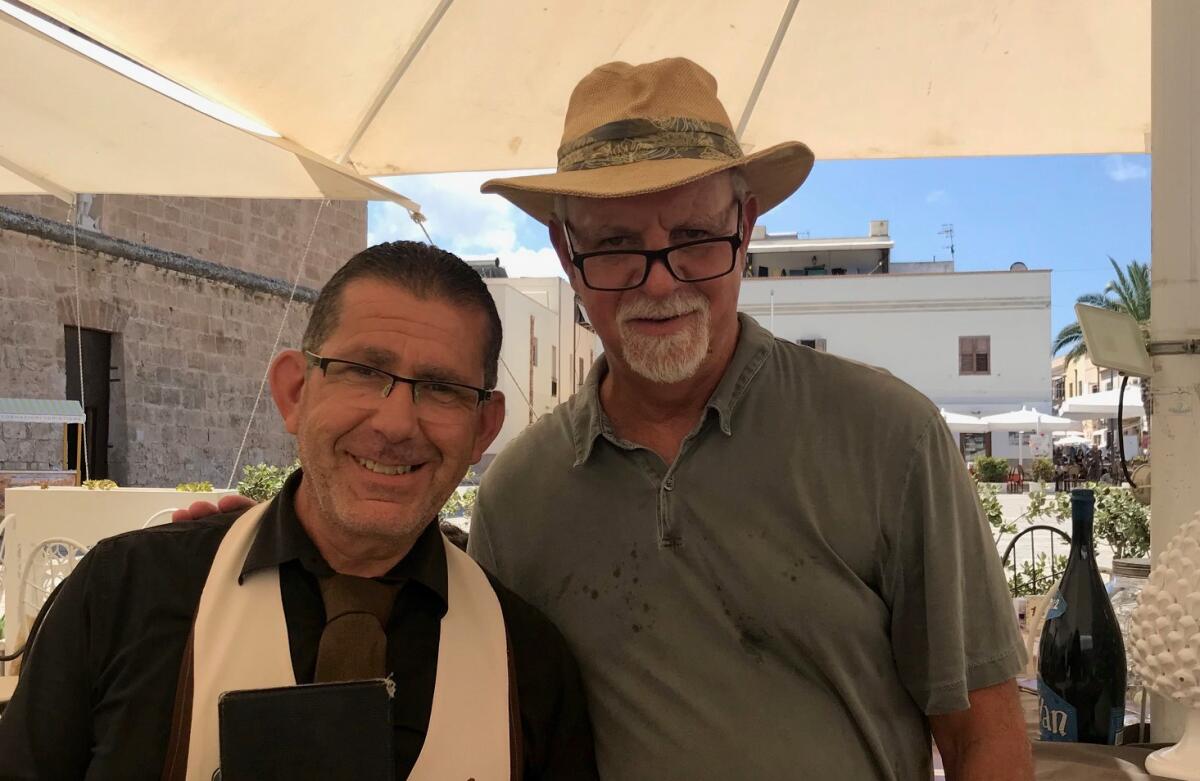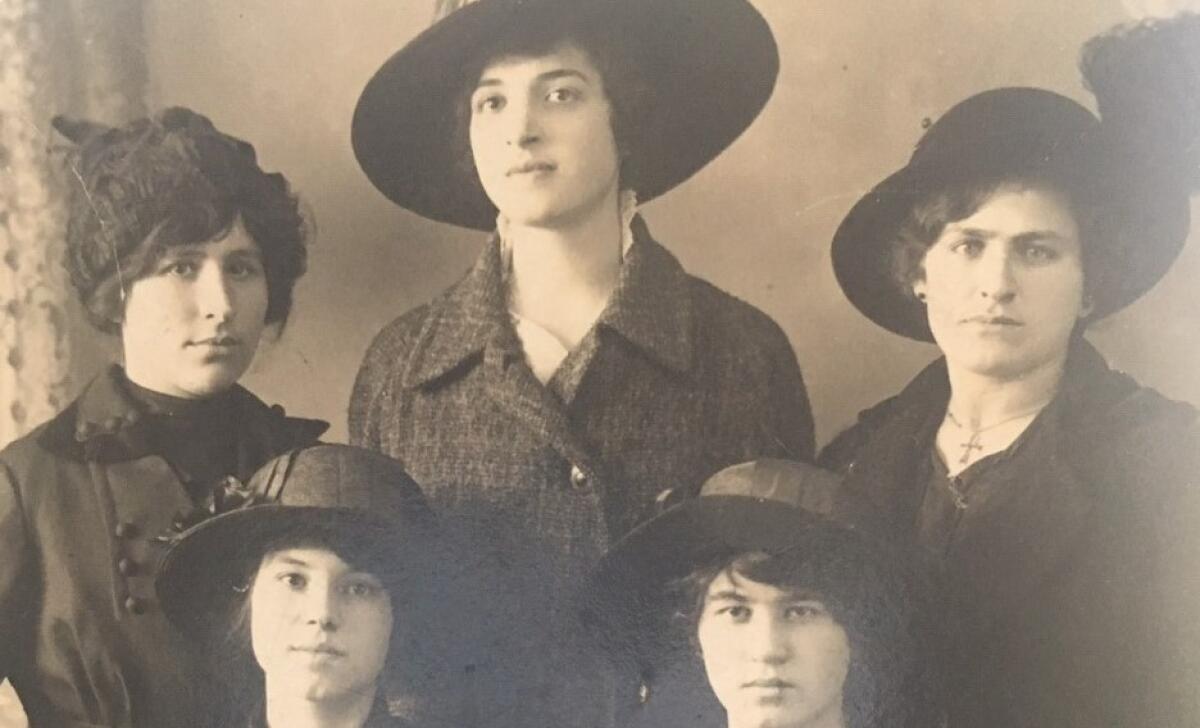Column: Steve Lopez goes to Italy and searches for his Sicilian roots

- Share via
If you’re trying to find long lost relatives, I hope you’re better at it than I am.
Last week, I walked the streets of San Vito Lo Capo, on the northwest tip of Sicily, looking for roots and branches of the family tree. But I didn’t have much to go on, and it didn’t help that I don’t speak Italian, or that few people in San Vito speak English.
Finding relatives wasn’t the main objective of the vacation with my wife and daughter, but still, I wished I’d done more research in advance. And I wished I’d asked my mother more questions about our family story before she died six months ago.
What I did know was that my grandmother, Josephine Costanza, left Sicily in the early 1900s as a young girl, landed in California and later married a young man recently off the boat from Naples, Italy. They opened a grocery store in the East San Francisco Bay town of Pittsburg — a place where many immigrants fished delta waters with the skills they had learned in the old country.

On the other side of the family, my father’s parents came from coastal Malaga, Spain. They opened a grocery store a few blocks away from the one my Italian grandparents ran, but both Spanish grandparents died before I was born, and my Sicilian grandmother died when I was 8.
One reason I’m short on family history is that many immigrants including my grandparents, though proud of their heritage, want to live in the present, not the past. They had reasons for leaving their countries of birth and were happy to be making new lives in the United States — a lot like today’s immigrants. They become Americans, and that’s how our country came to be.
I’d never been to Sicily, which could be a cousin to California. It was hot and dry, with vineyards crocheted across the hills and a rocky, spectacular coast. During one day of our visit, a wildfire forced the closure of a natural reserve.
San Vito Lo Capo is an unpretentious village with a stunning beach of white sand and turquoise water. Only a few thousand people live there, but the town swells in summer, when Italian families arrive on vacation.
As I took in the sights, it was hard to imagine anyone leaving such a gorgeous town behind for an uncertain fate in a distant land. But world history is a story of people in flight, always heading in the same direction, from hopelessness to opportunity. Someone born into privilege and affluence — let’s take the president of the United States, for example — can have trouble understanding the power of such yearning.
Sicily was controlled over the centuries by Spain, France, Greece, Italy and the Byzantine Empire, but seldom if ever did the island prosper. At the time my grandmother left with her family, the Mafia was increasingly exerting control, having filled a leadership vacuum. She was barely a teen, and I can imagine her being terrified and excited as she left her home and climbed aboard a ship to the unknown.
Paul Peralta, a cousin of mine from Oregon, happened to be in San Vito when I was there. His grandmother and mine were twin sisters. Paul knew plenty of Peraltas in San Vito, but he knew little about the Costanzas, and he was trying to make connections so he can apply for dual citizenship in Italy.
His cousin Maria Stella did her honest best to help us, making phone calls and talking up customers at her hair salon on San Vito’s main drag. She referred me to a clothing store run by a young man whose mother was a Costanza, and he might have been my cousin. But neither of us could be sure, and he appeared to be wondering what we’d do about it if, indeed, we were related.
I didn’t know him. He didn’t know me. I barely knew my grandmother, and she had left San Vito roughly 110 years ago. I was on a crazy mission, I had to admit. I have cousins I barely know in the United States, so why try to hook up with Italian relatives I might never see again?
My quest had something to do with my parents dying in recent years, with memories and regrets, with the meaning of family, and borders and what separates and connects us.
Maria Stella called an in-law who speaks English, and she rushed over to the hair salon to try and help. But her best advice was to go to the cemetery and look for gravestones with the name Costanza etched into them.
My cousin Paul refused to give up. Together we went to see another Peralta who knew of a Costanza at a tobacco shop. But that was a dead end. A fisherman told me he knew a few Costanzas once, but they were all dead.
Paul is going to be in San Vito for a few months, and he plans to search records at City Hall to trace our roots. But Maria Stella had one more idea. She marched us over to the home of a Canadian-Italian friend who knows everyone, and rapped on her door.
A red-haired woman answered, heard our plight, and stepped into the street to help. She scrunched her face, trying to think of a lead for us, and then it came to her. Go to Caffe Savoia and ask for a waiter, she said.
His name?
Salvatore Costanza.
“I saw him there this morning,” she said. “He should be there now.”
The Savoia is an outdoor cafe at the center of town, a hangout for locals and tourists. You sit there with a cappuccino in the morning, a Campari orange in the evening, and watch the flow of people, some of them lugging beach gear.
I saw a waiter and asked if his name was Salvatore. He nodded. I told him about my grandmother. He held out his hand and said, “Nice to meet you, Cuz.”
I asked where he learned to speak English so well.
“San Pedro,” he said.
His family had moved to California for work. His late father was a fisherman. Salvatore went to San Pedro High School and loved Los Angeles, but his family ended up back in San Vito and he followed them home.
Neither of us could make a definitive blood connection, with so much time lapsed and so many relatives gone. Maybe the records at City Hall will do that for us, maybe not. But Salvatore said he’d been told there were twins in the family going back, that many of his relatives had left Sicily in the early 1900s and that he had distant relatives in Pittsburg.
Salvatore said he misses the U.S. and would like to return one day.
“There’s so much opportunity,” he said, telling me San Vito shuts down between October and May.
I asked if he knew what might have prompted the Costanzas to leave for the U.S. more than a century ago, and he didn’t pause.
“Hunger,” he said.
More to Read
Sign up for Essential California
The most important California stories and recommendations in your inbox every morning.
You may occasionally receive promotional content from the Los Angeles Times.











